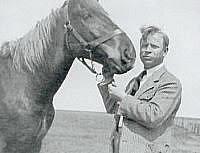 Read an article about Detlev Glanert's Shoreless River on Classical Iconoclast.
Read an article about Detlev Glanert's Shoreless River on Classical Iconoclast.Glanert is setting the whole Shoreless River saga into a series of operas.
"Reality ran off him like water off an oily surface, but he remained."
 Read an article about Detlev Glanert's Shoreless River on Classical Iconoclast.
Read an article about Detlev Glanert's Shoreless River on Classical Iconoclast.
Of all authors who achieved literary significance in the twenties and were silenced by Nazism in the thirties, Hans Henny Jahnn is least known to the average German reader. Today there are still people, even in literary circles, who are completely unfamiliar with his dramas like Die Kronung Richards III [The Coronation of Richard III], Medea, or Armut, Reichtum, Mensch und Tier [Poverty, Wealth, Man, and Beast] and his novels Ugrino und Ingrabanien and Perrudja, and who have known Jahnn himself only by name.... Such neglect seems unjust to a writer who as early as 1920 received the Kleist prize for his first play, Pastor Ephraim Magnus, and whose powerful novel Perrudja (1930) represents the first attempt in Germany, aside from a few prose works by Albrecht Schaeffer [??], to encompass our complex world by employing a new narrative method and by re-shaping the German language for artistic purposes such as James Joyce did in English.... Perrudja.... is an attempt to expose the confused modern consciousness and to transform the spontaneous, untouched flow of images, impressions, hidden perceptions and memories into the mind of Perrudja, the central character, who possesses many human qualities but not those usually required of a hero.... Unfortunately, this valuable experiment of breaking new paths for modern prose writing remained nearly unnoticed in Germany.
We have witnessed the horrible again and again, a transformation no one could foresee. A healthy body is run over by a truck, crushed. Blood, once secreted, once feeling its way blindly through the body, pulsating in a meshwork of thin streams, spreading the chemically charged hormones and their mysterious functions like a red tree inside man--this blood now runs out shapelesssly in great puddles. And still no one grasps that, in a network of veins, it has form. But even more horrible--the death struggle itself, in which the innumerable organs, which we believe we feel, take part. Terror is stronger in us than delight (p. 32).
 Hans Henny Jahnn's Thirteen Uncanny Stories, trans. Gerda Jordan (Peter Lang, 1984, now out-of-print, though copies still pop up).
Hans Henny Jahnn's Thirteen Uncanny Stories, trans. Gerda Jordan (Peter Lang, 1984, now out-of-print, though copies still pop up).

 When asked by PEN America "What great books have never been translated into English?" Tim Crouse (journalist and author of Boys on the Bus) responded:
When asked by PEN America "What great books have never been translated into English?" Tim Crouse (journalist and author of Boys on the Bus) responded:
"Two great peaks, one of fiction, the other of poetry, are still invisible to the English-speaking world, but it seems to me that once translations scatter the mist, the literary landscape will never look the same. (1) The novels of Hans Henny Jahnn (German, 1894-1959). So far as I know, only the first volume of his great "Fluss Ohne Ufer" trilogy has found its way into English: Das Holzschiff (The Ship, trans. Catherine Hutter, Scribners, 1961). That leaves the other two volumes still to go, plus Perrudja, Ugrino und Ingrabanien, and 13 Nicht Geheren Geschichten (Thirteen Unreassuring Stories)--all treasures. [Ed note: The last title mentioned by Crouse was indeed translated into English as Thirteen Uncanny Stories, though it seems to be out of print at the moment; see the rest of this post.] I know them from the French versions. (2) The poems of David Rosenmann-Taub (Chilean, b. 1927). Cortejo y Epinicio (Cortege and Epinicion), Los despojos del sol (The Spoils of the Sun), and El cielo en la fuente (The Sky in the Fountain) are among the most original, profound, and wrenching books of poetry I've read."
I have never encountered Rosenmann-Taub, but Hans Henny Jahnn is one of my favorite authors. This is my second post dedicated to him. Read the first here. To read the rest of PEN America's list, go here.
From Gerda Jordan's introduction to her translation of Thirteen Uncanny Stories by Hans Henny Jahnn (published by Peter Lang):
"'He was a writer of Baroque sexuality, of fleshiness and macabre desperation [...]. The reader continuously stumbles over coffins and tombs, witnesses deeds of horror, awesome fear of death and the performance of the necessities of metabolism....'
"Thus wrote Werner Helwig to his close friend Hans Henny Jahnn. It was not Helwig's own criticism of Jahnn, but that of a critic he had invented in order to show Jahnn what the public thought of his work. No invented critic was needed, however; Jahnn is known as 'the writer who uncovered the hells of the flesh and drives, the abyss of demoniacal passions and sinister licentiousness,' his writings are described as 'materialism of pure faith in the body,' his reader is 'numbed by the eternal drone of the hormone organ.' Polite euphemism calls him the 'uncomfortable' writer.
"The object of this and similar criticism, Hans Henny Jahnn, novelist and dramatist, misunderstood in his life time and since his death, is little known in his own country, not to mention the outside world..."
***


